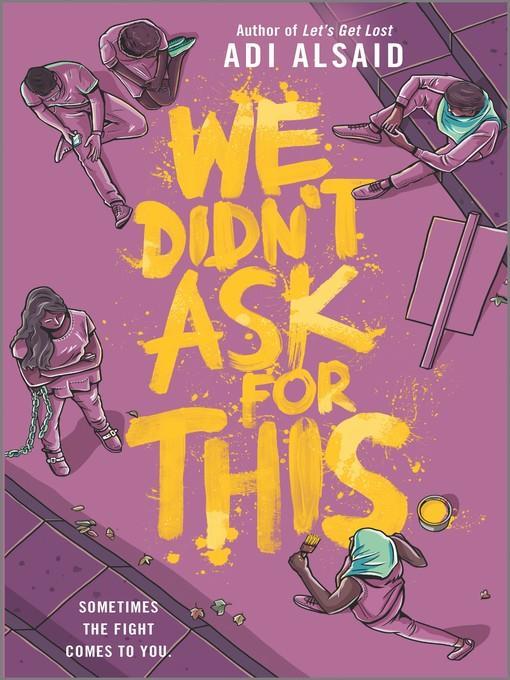
We Didn't Ask for This
کتاب های مرتبط
- اطلاعات
- نقد و بررسی
- دیدگاه کاربران
نقد و بررسی

February 1, 2020
Gr 8 Up-Both a wide range of activities and a traditional secret party make the annual lock-in night at Central International School highly anticipated by the diverse, well-to-do student body. Marisa Cuevas plans for months, removing tools from school property and bringing in extra food to stage an ecoprotest during the lock-in. Marisa, Lolo, Eli, Joy, and Malik chain themselves to the exits, swallow the keys, and provide a list of demands, essentially taking 276 students and many teachers hostage. As tension and frustration build, violence toward Marisa begins, and soon a group of Protectors form around her: highly athletic lesbian Amira Wahid; Celeste, a black American student and introvert; improv-loving Kenji Pierce, whose father is building the Lokoloko resort that Marisa is protesting; and Peejay Singh, a gay, charismatic, popular student in charge of planning the party while his brother is in the hospital from a terrible accident. Though the premise is unique, plot details such as the unrealistic reactions of law enforcement are implausible. Readers may find it hard to keep track of so many main characters, and slow pacing may cause them to lose interest in the outcome. VERDICT Not recommended for purchase, as there are better choices with diverse characters and stronger story structure.-Laura Jones, Indiana State Library, Indianapolis
Copyright 2020 School Library Journal, LLC Used with permission.

February 1, 2020
An elite international school community reacts to one student's climate protest. Marisa Cuevas, cued as Latina, is known mostly for being a good student until she, with several followers, chains herself to the doors of Central International School on its legendary high school lock-in night--turning a playful tradition into literal imprisonment. Nobody's leaving, she says, until each of her 30 environmental demands is met. She's prepared for condemnation and even fury from her classmates, but she doesn't expect the unlikely group that forms to protect her. Alsaid (contributor: It's aWhole Spiel, 2019, etc.) takes readers deep into the students' inner lives, winking all the while to offset the protest's tragic urgency: Peejay Singh, half Indian/half Scottish, all charm and popularity, desperate to live up to his older brother's example. Celeste Rollins, the black American new kid who befriends Japanese/British Kenji Pierce through improv but doesn't yet know his terrible secret. Jordi Marcos (ethnicity and nationality unspecified), the outlier who isn't sure himself why he's against the protest--but still is, violently. Finally, Malaysian decathlete Amira Wahid, who finds her mother's strictures falling away under Marisa's fierce gaze. Packed with quips and insights, the wry narrative captures the intense yearnings of young adulthood; the ridiculous spectrum of clueless, controlling, and (sometimes) cooperative adults; and the overwhelming inertia of institutions. Several main characters are queer. A droll, engrossing exploration of privileged teens striving to do better. (Fiction. 13-18)
COPYRIGHT(2020) Kirkus Reviews, ALL RIGHTS RESERVED.

Starred review from February 10, 2020
In a timely novel featuring a large cast from around the globe, Alsaid (Brief Chronicle of Another Stupid Heartbreak) underlines ecological issues while showing the positive impact of creative problem solving and collaboration. Lock-in night is a much-anticipated event held annually at Central International School, located in an unnamed country—it’s a night when “people fell in love... stumbled upon new passions... discovered friendships.” But this year’s event may be the most life-changing of all after student activist Marisa and her cronies, demanding a list of 30 changes at the school and globally, chain themselves to the doors, preventing anyone from entering or exiting the building. Lock-in plans are suspended, ruining Peejay’s plan to throw an epic party, Kenji’s improv team showcase, and Amira’s chance to win the decathlon. Ironically, these students become Marisa’s protectors as other angry students attempt to thwart her mission and the lock-in stretches on. Through multiple points of view, Alsaid movingly examines characters’ home lives, their dreams and crushes, and their changing attitudes, leaving readers to decide whether the protest is a success. Ages 13–up. Agent: Pete Knapp, Park & Fine Literary.

February 15, 2020
Grades 9-12 When teen activist Marisa stages an environmental protest during her school's annual Lock-In, the building turns into a prison, forcing her and a diverse array of characters to face hard truths about who they want to be and what kind of world they want to live in. The novel progresses with a light-hearted tone at a rapid pace, deftly exploring timely issues such as ecology and preservation, and Alsaid weaves in discussions about all forms of identity?nationality, race, religion, language, gender, sexual orientation. Amid the chaos of the protest, parallel story lines touch on the magic of high-school parties, finding a sense of belonging, pursuing dreams, and defying cliques and stereotypes to make sense of messy high-school drama. As the Lock-In unfolds, vignettes show students coming into themselves as they discover that privilege affords the opportunity to make a difference?but doesn't shield from basic emotions. Marisa's message spreads through the school and beyond, and while Alsaid expertly blurs the line between right and wrong, he puts the power in the students' hands.(Reprinted with permission of Booklist, copyright 2020, American Library Association.)

























دیدگاه کاربران